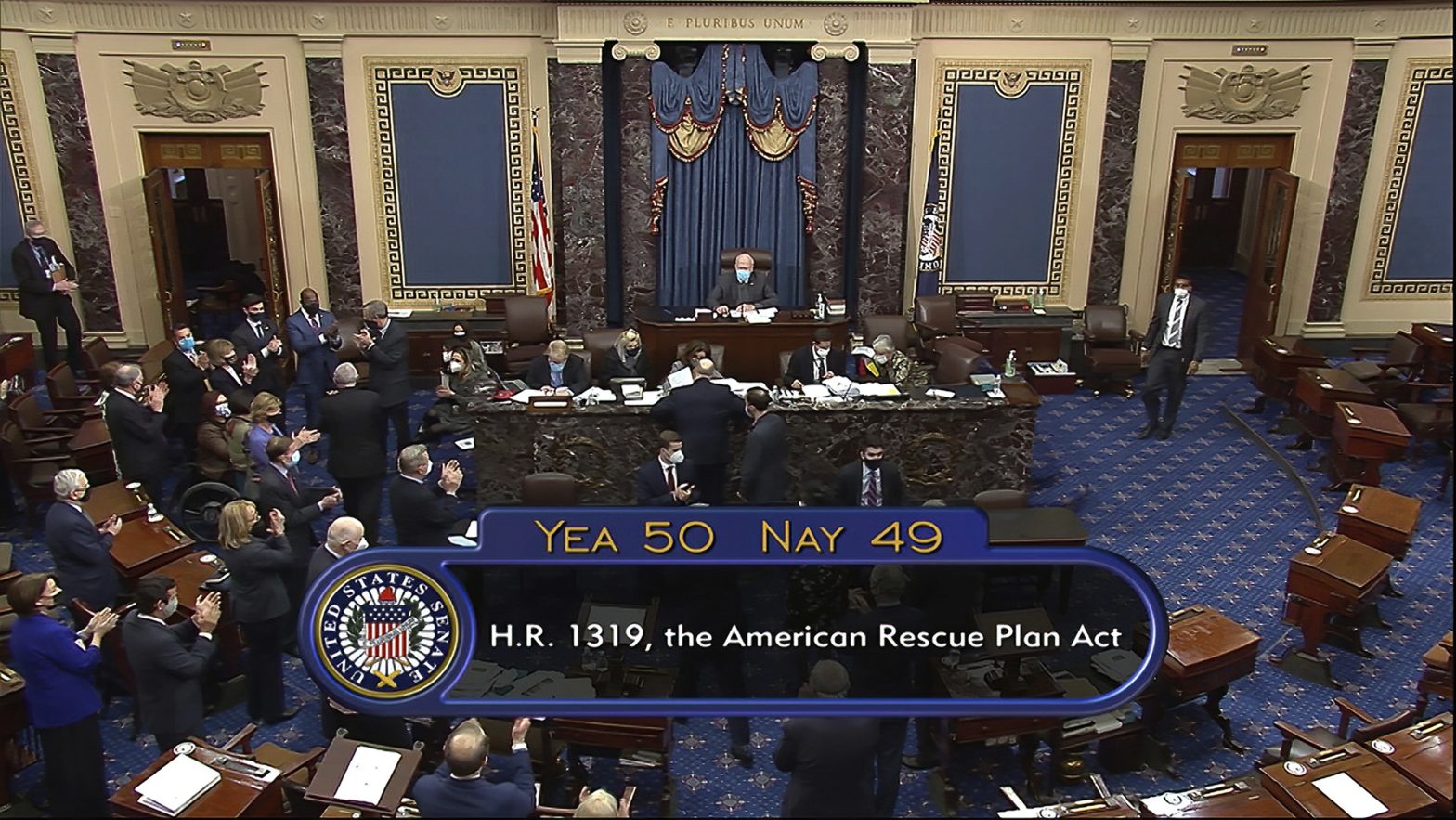Senate Approves $1.9 Trillion COVID-19 Relief Package

WASHINGTON – The Senate on Saturday afternoon narrowly passed the $1.9 trillion COVID-19 relief package with a 50-49 vote down party lines, moving the rescue plan one step closer to President Joe Biden’s desk.
The package, settled on after hours and hours of delays and Senate haggling, includes direct payments of up to $1,400 for hundreds of millions of Americans, jobless aid of $300 a week to last through the summer, money for distributing coronavirus vaccines and relief for states, cities, schools and small businesses struggling during the pandemic.
“It has been a long day, a long night, a long year. But a new day has come,” Senate Majority Leader Charles Schumer said on the floor of the chamber. “We tell the American people, help is on the way.”
The House will vote on the Senate-amended relief package on Tuesday, House Majority Leader Steny Hoyer, D-Md., said Saturday afternoon.
“On Tuesday, the House will consider the Senate’s amended version of the American Rescue Plan, so that we can send this bill to President Biden for his signature early next week,” Hoyer said in a statement.
“Democrats are delivering on our promise to take action to defeat this virus and provide the assistance the American people need until our economy can reopen safely and fully.”
Final passage came after a grueling 27-hour session in which Democrats beat back dozens of Republican efforts to change the bill, and scaled back the jobless aid to placate moderates in their own ranks who were concerned that an overly generous federal payment would keep Americans from returning to work, stifling the recovery.
The marathon session featured the longest vote in modern Senate history, as Democratic leaders stalled for time amid last-ditch negotiations with Sen. Joe Manchin III of West Virginia, a moderate holdout, to trim the unemployment benefits so the measure could proceed.
In the end, they agreed to reduce the federal unemployment bonus from $400 to $300 per week and lower income restrictions to determine who receives a stimulus check.
Meanwhile, Senate Republicans and some Democrats successfully blocked provisions to increase the federal minimum wage to $15 an hour.
The package is the first major legislative initiative of Biden’s presidency.
Speaking at the White House after the vote, President Biden told reporters the process “wasn’t always pretty,” but the relief package is “so deperately nedded.
“It’s going to make a big difference for so many lives in this country,” Biden said, adding, “passing this bill show that this government, this democracy can still work,”
Asked for his reaction about getting no Republican support on the COVID relief bill, Biden said, “Look, the American people strongly support what we’re doing here. That’s the key here.”
After the vote, Republicans continued to voice their displeasure with the package.
“The Senate has never spent $2 trillion in a more haphazard or less rigorous way,” Senate Republican Leader Mitch McConnell said.
“Voters handed Senate Democrats the slimmest possible majority, shrunk the House Democrats’ majority, and picked a president who promised unity and bipartisanship. Democrats have responded by ramming through what they call ‘the most progressive domestic legislation in a generation’ on razor-thin and purely partisan majorities in both chambers,” he continued.
“The right path was obvious. We followed it five times last year. In 2020 we passed five historic pandemic rescue packages totaling $4 trillion. Not one of them got fewer than 90 votes in the Senate or about 80% of the House. Last March, I convened the bipartisan task forces that wrote the historic CARES Act. Republicans and Democrats worked shoulder to shoulder.”
In the end, McConnell said, the package is “a colossal missed opportunity for our nation.”
Likewise, Sen. Lindsey Graham, R-S.C., the ranking member on the Senate Budget Committee, said in a statement that “Ninety percent of what’s in this bill has nothing to do with COVID. It is a liberal wish list. This is an opportunity to spend money on things unrelated to COVID, and Democrats are doing it because they can.
“The job-killing minimum wage increase has been dropped from this bill, but here’s what’s left: Paycheck Protection Program loans for labor unions, a $350 billion blue state bailout, a new paid leave program for federal employees with no oversight, and an $86 billion bailout for union pensions. What does that have to do with COVID? Nothing,” Graham said.
“This bill also has $20 million for the preservation and maintenance of Native American languages, $135 million for the National Endowment for the Arts, and $135 million for the National Endowment for the Humanities. These might be things we want to do, but it’s got nothing to do with COVID,” he continued.
“Voting for this bill was a choice my Democratic colleagues made. And we’re going to hold them to that choice,” Graham said.
Meanwhile, House Speaker Nancy Pelosi called Saturday’s passage of the bill “a day of great progress and promise for the American people.”
“The House now hopes to have a bipartisan vote on this life-saving legislation and urges Republicans to join us in recognition of the devastating reality of this vicious virus and economic crisis and of the need for decisive action,” she said.
Pelosi said the American Rescue Plan “takes a tremendous step forward to defeat the virus and provide relief to families and small businesses in need.
“It honors our heroes – our health care workers, food, sanitation and transportation workers, and teachers – who are on the frontlines on the state and local level,” she said. “It crushes the virus with the equitable and immediate distribution of the vaccine. And it puts our children safely back in school and puts workers back on the job. Overall, this coronavirus-centric legislation puts nearly a trillion dollars in the pockets of America’s families.
“The American Rescue Plan is a beacon of hope for America’s families and a sign that, as President Biden has promised: Help Is On The Way,” Pelosi said.
























